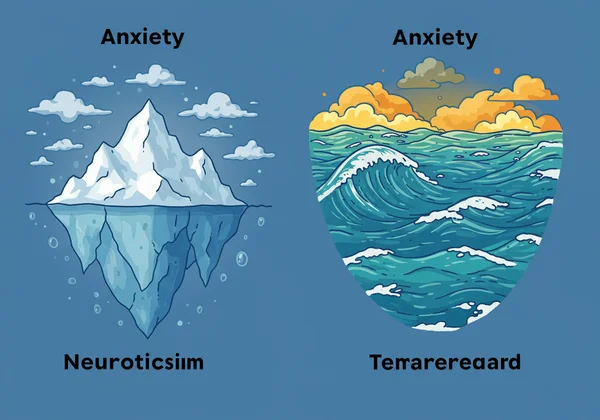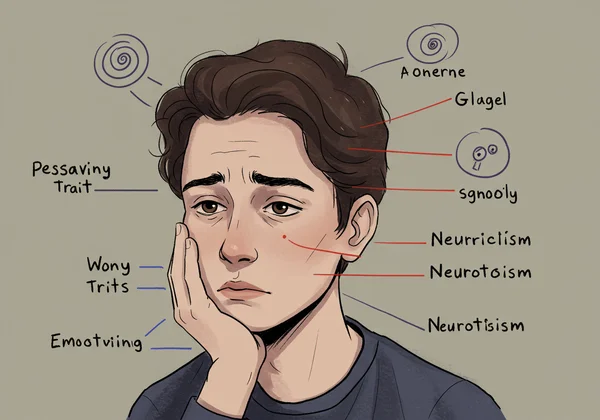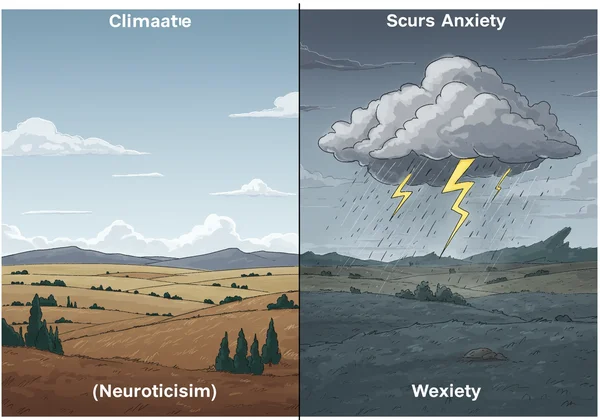Neuroticism Test vs. Anxiety: Key Differences & Insights
July 21, 2025 | By Alicia Campos
Do you often find yourself caught in a loop of worry, or feel that you're more sensitive to stress than others? It’s a common experience, and many people use the terms "neuroticism" and "anxiety" interchangeably. However, understanding the difference between them is a crucial step toward greater self-awareness and emotional well-being. This article will clarify the distinctions between neuroticism vs anxiety, helping you understand your emotional patterns more precisely. How do I know if I have neuroticism? The answer begins with knowledge, and this guide is your starting point.

Grasping whether you're dealing with a long-term personality trait or a temporary emotional state can empower you to find the right strategies for management and growth. It shifts the focus from feeling overwhelmed to taking proactive steps. To begin this journey of self-discovery, you can take the first step with a clear, insightful assessment.
What is Neuroticism? Understanding a Core Personality Trait
First, let's establish what neuroticism is. It is not a fleeting mood or a disorder; it is a fundamental, long-term personality trait. Think of it as a person's baseline tendency to experience negative emotions like sadness, anger, guilt, and fear. Everyone falls somewhere on the neuroticism spectrum, from very low to very high.
This trait is a core component of one of the most respected frameworks in modern psychology. Understanding its place in this model helps demystify the concept and grounds it in scientific research. It's less about a label and more about a dimension of your unique personality.
Neuroticism in the Big Five Personality Model
Psychologists often use the Big Five Personality Model to describe the building blocks of human personality. The five traits are Openness, Conscientiousness, Extraversion, Agreeableness, and Neuroticism. Within this framework, neuroticism is contrasted with its opposite pole, emotional stability.
A person with a high neuroticism score tends to be more emotionally reactive and vulnerable to stress. Conversely, someone with a low score (high emotional stability) is typically calmer, more even-tempered, and resilient. This doesn't make one better than the other; they are simply different ways of experiencing the world. Our scientifically-backed neuroticism test is designed to measure where you fall on this specific spectrum.
Common Signs and Characteristics of High Neuroticism
How does a person with high neuroticism typically behave? They often have a lower threshold for stress and may perceive ordinary situations as threatening or overwhelmingly difficult. This can manifest as a tendency to worry excessively about things that might go wrong.
Common signs associated with higher levels of neuroticism include:
- Frequent feelings of anxiety, worry, or fear.
- A tendency toward sadness or irritability.
- Dramatic shifts in mood in response to life events.
- Difficulty calming down after a stressful experience.
- High levels of self-consciousness or social anxiety.
Recognizing these patterns is the goal of a neuroticism symptoms test, which helps identify these underlying predispositions rather than a temporary emotional state.

What is Anxiety? Exploring a State and Potential Disorder
Now, let's turn to anxiety. Unlike neuroticism, which is a stable trait, anxiety is an emotional state. It is a feeling of unease, such as worry or fear, that can be mild or severe. It’s a normal human response to stressful situations, like feeling nervous before an exam or a job interview.
Anxiety becomes a concern when it is persistent, excessive, and begins to interfere with daily life. While someone with high neuroticism is more prone to feeling anxious, the feeling of anxiety itself is a distinct experience. You can be a generally stable person (low neuroticism) and still experience anxiety in response to a major life challenge.
Types of Anxiety: From Everyday Feelings to Clinical Conditions
Anxiety exists on a wide spectrum. On one end, you have the normal, everyday worries that come and go. On the other end are clinical anxiety disorders, such as Generalized Anxiety Disorder (GAD), Panic Disorder, and Social Anxiety Disorder. These are diagnosed by healthcare professionals and involve intense, persistent anxiety that significantly impacts functioning.
It's crucial to remember that online tools, including an online personality test for anxiety, are for self-reflection and educational purposes only. They are not a substitute for professional medical advice or diagnosis. If you feel your anxiety is severe or unmanageable, please consult a mental health professional.
How Anxiety Manifests in Thoughts, Feelings, and Behaviors
Anxiety isn't just a mental experience; it affects your entire being. Cognitively, it can lead to racing thoughts, difficulty concentrating, and catastrophizing (imagining the worst-case scenario). Emotionally, it involves feelings of dread, panic, and irritability.
Physically, anxiety can cause a racing heart, shortness of breath, trembling, and an upset stomach. Behaviorally, it often leads to avoidance of situations that trigger these feelings. Answering the question, "Am I neurotic or just anxious?" involves seeing if these feelings are a frequent reaction pattern (high neuroticism) or tied to specific triggers. To get a baseline of your personality trait, you can explore your personality trait on our platform.
Neuroticism vs. Anxiety: Key Differences & Shared Ground
So, what is the core difference between anxiety and neuroticism? The simplest way to put it is: Neuroticism is the climate, while anxiety is the weather. Neuroticism is your underlying emotional disposition, while an anxiety attack is a specific storm that passes.

Here’s a breakdown of the key distinctions:
- Trait vs. State: Neuroticism is a stable personality trait. Anxiety is a temporary emotional state.
- Scope: Neuroticism encompasses a broad range of negative emotions, including anger, depression, and vulnerability. Anxiety is primarily focused on fear, nervousness, and worry.
- Relationship: High neuroticism is a significant risk factor for developing anxiety and mood disorders. It creates a fertile ground for anxiety to grow, but it is not anxiety itself.
Is Neuroticism Just Anxiety? Clarifying the Relationship
To directly answer the common question, is neuroticism just anxiety? No, it is not. A person high in neuroticism is wired to experience all negative emotions more intensely and frequently, with anxiety being one of the most common. Think of neuroticism as turning up the volume on your emotional responses.
A person with low neuroticism might feel anxious before public speaking but recover quickly. A person with high neuroticism might start worrying about the event weeks in advance, feel intense anxiety during it, and then ruminate on their performance for days afterward. The feeling is anxiety in both cases, but the intensity, duration, and frequency are influenced by the underlying trait of neuroticism.
Why Distinguishing Them Matters for Your Self-Understanding
Understanding this distinction is incredibly empowering. If you know you have a high level of neuroticism, you can learn to work with your personality instead of fighting it. You can develop proactive strategies to manage your sensitivity to stress and regulate your emotions before they spiral into overwhelming anxiety.
Conversely, if your anxiety is situational and not tied to high neuroticism, your approach might focus more on addressing the specific trigger or situation. An emotional stability test provides this foundational piece of the puzzle, giving you a clear picture of your emotional baseline. Get your free score to see where you stand.
Gaining Clarity with Our Neuroticism Test Online
The most effective way to understand your personal level of this core trait is to take a neuroticism test online. Our assessment is designed to move you from confusion to clarity. It provides a reliable, data-driven snapshot of your natural disposition toward emotional experiences.

This is not about diagnosing a problem; it's about providing a tool for self-exploration. By answering a series of targeted questions, you receive a score that helps you understand your emotional makeup, serving as a foundation for personal growth.
How Our Free Neuroticism Test Provides Insights
So, what is a neuroticism test? Our free neuroticism test consists of 20 questions based on the established Big Five psychological model. It's designed to measure your tendencies over time, not just how you feel today. The process is simple: answer the questions honestly, and you’ll receive an instant score summarizing your neuroticism level.
This score gives you an objective starting point. It helps you understand if your frequent feelings of worry are part of a broader personality pattern. For those seeking deeper understanding, we also offer an optional, AI-powered analysis report that provides personalized strategies and action plans. You can take the free neuroticism test right now.
What Your Neuroticism Score Can Tell You About Emotional Stability
Your score from the neuroticism assessment directly reflects your level of emotional stability. A high neuroticism test result suggests you may be more prone to emotional ups and downs. A low neuroticism score indicates a greater natural resilience and emotional steadiness.
Neither score is "good" or "bad." A person with high neuroticism may also be highly creative, empathetic, and have a strong sense of self-awareness. The key is understanding. Your score helps you anticipate challenges, leverage your strengths, and build a more fulfilling life aligned with your personality. If you're ready for deep insights, start your test now.
Empower Your Emotional Well-being: The Power of Neuroticism Test Insights
Understanding the difference between the personality trait of neuroticism and the emotional state of anxiety is empowering. While they are deeply intertwined, recognizing whether you're dealing with your baseline climate or a temporary weather pattern is vital for effective self-management. Knowledge is the first step on the path to greater emotional balance and personal growth.
Don't stay in the dark about your emotional patterns. Take action today to gain objective, personalized insights into your unique personality. We invite you to discover your emotional landscape by taking our free, science-based Neuroticism Test on our homepage.
Frequently Asked Questions About Neuroticism and Anxiety
What is a neuroticism test, and how does it differ from an anxiety test?
A neuroticism test measures a stable, long-term personality trait related to your general tendency to experience negative emotions. An anxiety test, in contrast, typically assesses your current state or symptoms of anxiety. Our test focuses on the foundational trait to give you a broader understanding of your emotional landscape.
How do I know if I have high neuroticism or just experience anxiety?
Consider the pattern. Is your worry tied to specific, stressful situations (more like state anxiety), or do you feel a general sense of unease and emotional reactivity across many different contexts (more like trait neuroticism)? The most reliable way to know for sure is to take a validated high neuroticism test like ours to get an objective baseline.
Can a neuroticism test help me manage my anxiety?
Absolutely. By understanding your baseline neuroticism level, you can identify your personal risk factors for anxiety. A neuroticism test provides the self-awareness needed to build proactive coping strategies, helping you manage your emotional responses before they escalate into severe anxiety. It’s the foundational step for effective self-management.
What does a high neuroticism score mean for my emotional stability?
A high neuroticism score indicates lower emotional stability. This means you may be more sensitive to stress and more likely to experience feelings like worry, sadness, and irritability. However, this is not a life sentence. It is a piece of information you can use to build resilience, practice mindfulness, and develop healthier coping mechanisms. Find clarity here to begin.